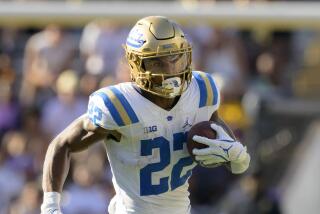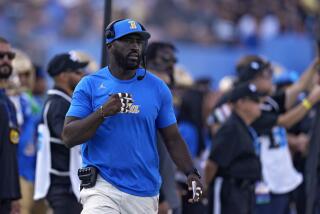Mirage Bowl Trip Not All It Appeared to the Teams
- Share via
TOKYO — It’s too late to call off the Mirage Bowl game now, but Oregon Coach Rich Brooks said that he wouldn’t have allowed his team to play in the game if he had been informed earlier of the accommodations here.
The show will go on, with USC playing Oregon Saturday in Olympic Memorial Stadium. But Brooks was clearly disappointed that his team is not being treated in a first-class manner, as were previous Mirage Bowl teams.
Oregon and USC are staying in the same hotel, the Miyako Inn, along with the Trojan and Grambling State University bands. The rooms are cramped and the beds are long enough to satisfy jockeys, but not football players.
“The facilities are not what we were led to believe they were,” Brooks said. “The accommodations are not suited for big football players. The rooms are small and the beds are small.
“I have a 6-foot 8-inch guy with a bad back who sits on a plane for 11 hours and then has to come into cramped quarters with a small bed.”
USC Coach Ted Tollner would not comment publicly on the accommodations but left the distinct feeling that he was in accord with Brooks.
Brooks is also disturbed that Mirage Bowl officials haven’t planned any tours or special events for his players.
“I thought we’d see some of the culture of the city,” he said. “But there is nothing for the team.
“The thing that disturbs me is that you go into something like this and the players are the people who get the short end of the stick. They ought to get the big end of the stick. There should be some things for them to do.
“I don’t think the people who put this game together had the players’ interests at heart. I thought it would be a great experience and, for the most part, it will be. But it leaves a bad taste in your mouth. They show you how it’s supposed to be and, when you get here it’s not that way at all.”
Brooks said he’d had every reason to expect that Oregon and USC would have first-class accommodations. Administrators from both schools, who had scouted the facilities earlier, brought back that report.
Herb Yamanaka, an assistant Oregon athletic director, said that the Miyako Inn is like a “Motel 6” compared to accommodations afforded previous participants in the Mirage Bowl.
Brooks, however, is telling his players to be flexible, pointing out that USC is in the same fix as his team.
It’s a cozy arrangement, to say the least.
It’s also obvious that the small rooms, some only 9 feet wide and 21 feet long, make it a tight squeeze for the football players.
USC center Tom Cox, 6-4 and 260, and offensive guard Jeff Bregel, 6-4 and 280, share a room.
“We can’t move at the same time, or there are problems,” Cox said.
James FitzPatrick, USC’s 6-8 280-pound offensive tackle, said he has to sleep curled up in a ball. And, when he stands up, he said, he has to stoop to avoid the sprinkler system.
The Pacific 10 game was originally scheduled for Oct. 12 at the Coliseum. It was then rescheduled as the Mirage Bowl when both schools reportedly reached an agreement with Teleplanning International Inc., a Tokyo-based firm that organizes the game.
But Yamanaka said that Oregon was not satisfied with the arrangement as late as last week, when the school finally signed a contract. USC signed a contract with the Mirage Bowl about two months ago.
The negotiations went on for several months, and USC officials still weren’t certain that they would play in the game until last summer, when the Mirage Bowl promoter made a dramatic gesture with the flair of an old Edward G. Robinson movie.
Atushi Fujita, president of Teleplanning International Inc., literally showed the color of his money. According to sources close to the school, Fujita brought $250,000, all in $1,000 bills, into the office of a startled USC administrator, who nervously guarded the money until it could be deposited.
USC’s guarantee is reportedly higher than Oregon’s. Yamanaka said that he believes Oregon is receiving $100,000 and expenses.
Both teams practice on muddy, weed-filled field without locker-room facilities. So the teams must dress in the hotel before workouts. The players don’t put on their shoulder pads until they leave the rooms.
If they did, they probably couldn’t get through the door.
There won’t be any secrets between the teams. The walls are thin and the players mingle. They might as well exchange game plans and just get it over with.
It’s an opportunity, though, for each team, now 5-5, to finish the regular season with a winning record and to improve on its Pac-10 standing. USC is the fifth-place team in the conference at 4-3; Oregon is sixth at 3-3.
USC’s season will be extended, however, with an Aloha Bowl game Dec. 28 in Honolulu against, probably, Alabama. It would be a bit embarrassing for the Trojans to take on the Crimson Tide (7-2-1) with a losing record.
The Mirage Bowl is not to be confused with a post-season bowl game, but Brooks is regarding it as a real bowl game.
“Teams like Oregon and Washington State have to have a better record (than USC’s) to get invited to a bowl game,” he said. “That’s the price we pay for the football tradition and history at USC. It’s like trying to get the heavyweight championship. The challenger has to be much better.
“That’s just a fact of life, but that doesn’t mean I have to like it.”
There is some sentiment among USC people that the Trojans shouldn’t have accepted the Mirage Bowl invitation. They contend that USC gave up the home-field advantage in a conference game for a neutral site.
Still, there are supposed to be cultural advantages to playing this rather anticlimactic game in a foreign country. So far, though, the Ducks and Trojans haven’t been exposed to them.
More to Read
Go beyond the scoreboard
Get the latest on L.A.'s teams in the daily Sports Report newsletter.
You may occasionally receive promotional content from the Los Angeles Times.










